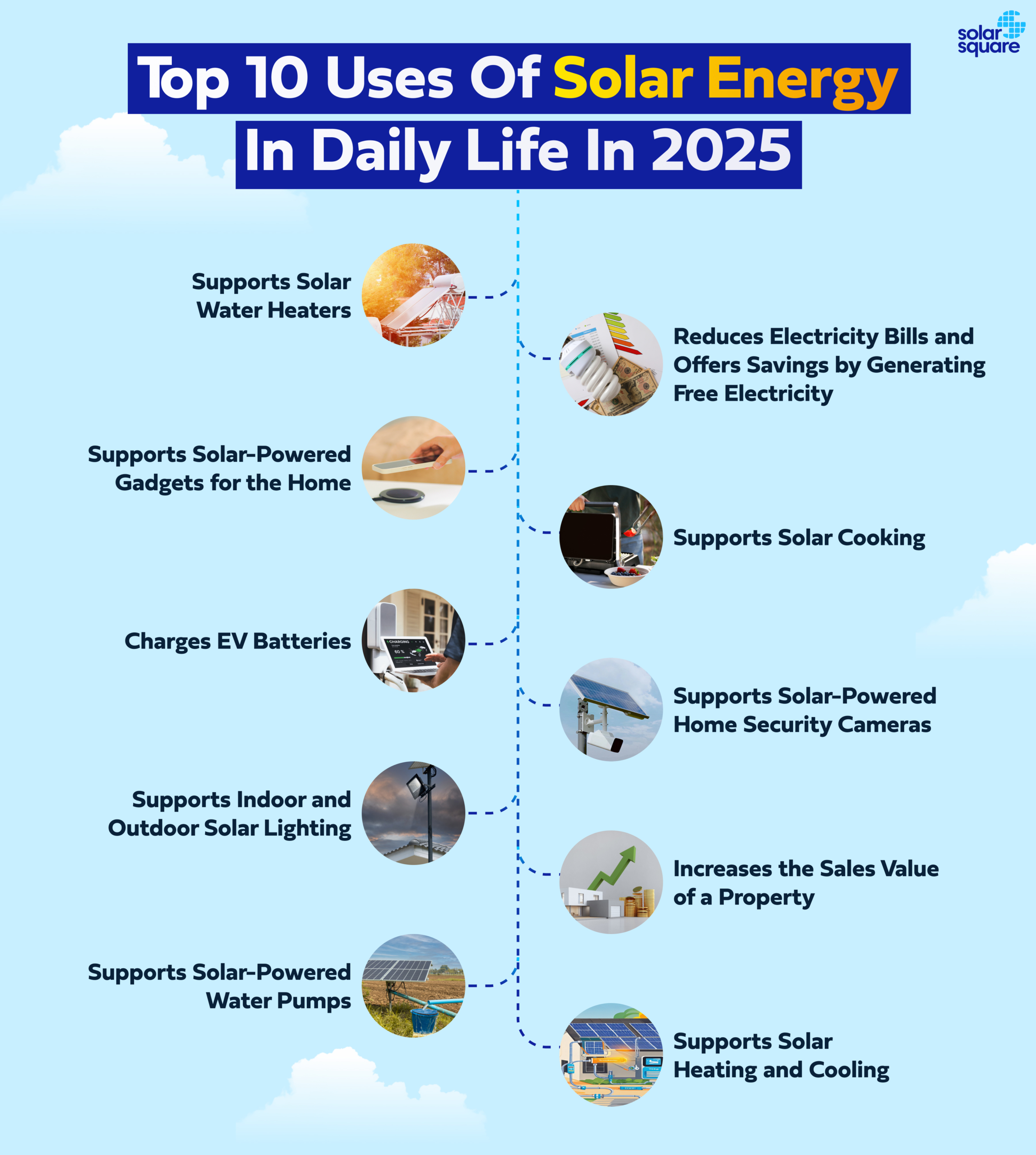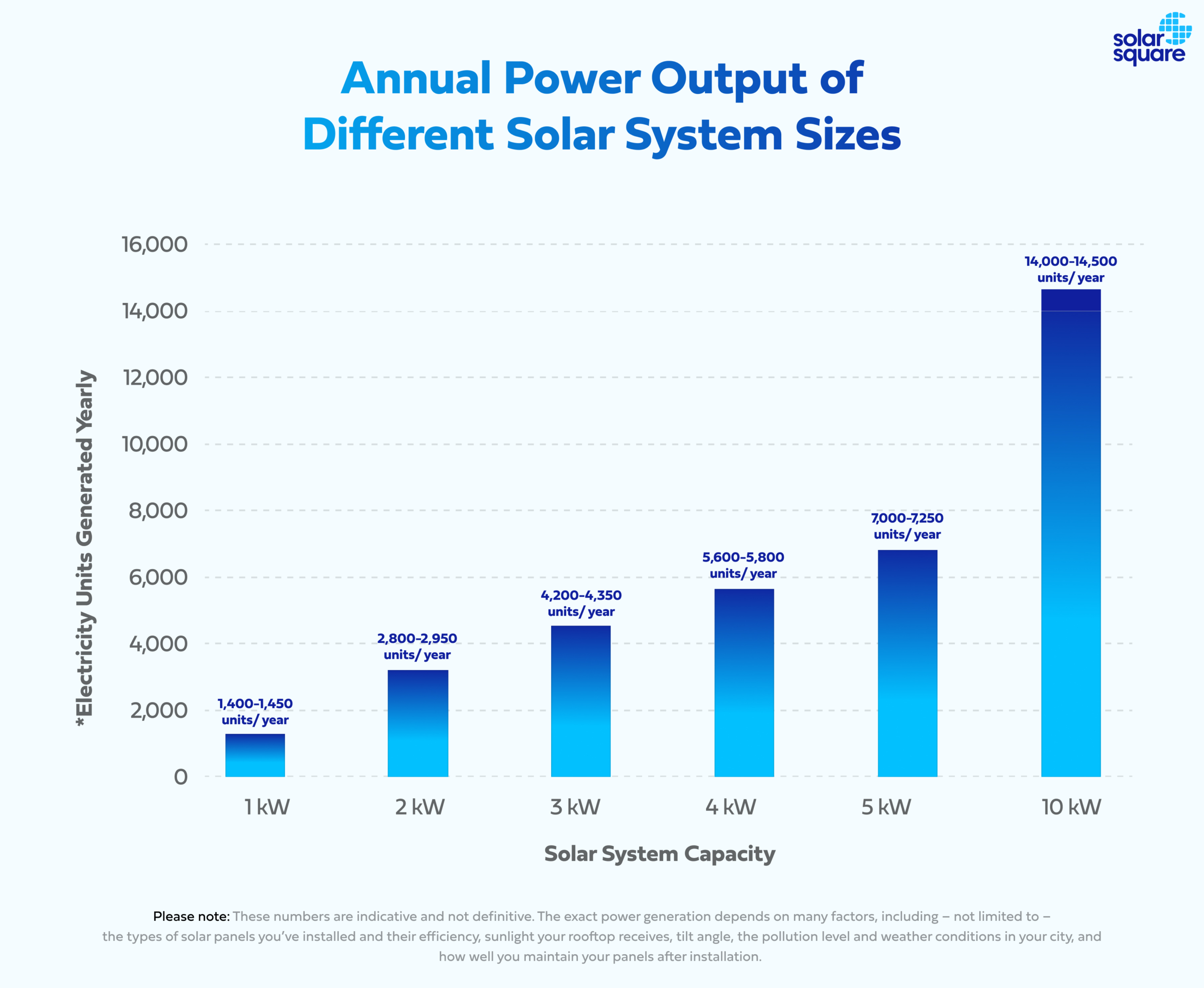
India is the world’s fifth-largest deployer of solar energy, and for good reason. There are many uses of solar energy in daily life, ranging from generating free electricity to running household appliances, reducing pollution, offering the means to cook food and heat water without skyrocketing your electricity bill, supporting solar-powered gadgets for the home, and much more.
Moreover, solar energy at home is the perfect replacement for running heavy appliances like ACs, water pumps, and geysers that otherwise consume most electricity in a home.
Ready to explore how to use solar energy at home and plummet hefty electricity bills? This guide uncurtains the top 10 uses of solar energy in daily life that you must know if you’re planning to install an on-grid rooftop solar system at your home. Dive in!
What Are the Top 10 Uses of Solar Energy in Daily Life?
Installing a solar system at home is beneficial for the environment as well as your bank balance. Let’s explore the top 10 uses of solar energy in daily life and understand how switching to solar can impact your life.

1. Reduces Electricity Bills and Offers Savings by Generating Free Electricity
The electricity bills in India inflate by 3% to 6% annually. While a solar system degrades annually by 1%, with proper maintenance, it continues to operate at maximum efficiency for at least 25 years. Considering both factors, we’ve created an estimate of how much money a 5 kW solar system will save you in 25 years. Have a look!
| How Much Money Can a 5 kW Solar System Save in 25 Years? | ||
|---|---|---|
| City | Current Electricity Tariff Per Unit | *Savings From Solar in 25 Years As of June 3, 2025 |
| Nagpur | Rs. 15.2 | Rs. 34.43 lakh |
| Bhopal | Rs. 9.19 | Rs. 20.96 lakh |
| Pune | Rs. 15.2 | Rs. 33.46 Lakh |
| Bengaluru | Rs. 7.11 | Rs. 16.22 lakh |
| Lucknow | Rs. 7.0 | Rs. 14.62 lakh |
*Please note: While calculating savings we have considered Annual Tariff escalation at 3%, Annual degradation at 1%. The actual final savings from solar panel installation depend on the types of solar panels you’ve installed and their efficiency, intensity of sunlight your rooftop receives, orientation of the panels and tilt angle, the pollution level and weather conditions in your city, the temperature, shadow on the roof, impact of dirt/dust, and how well you maintain your panels after installation.
Can’t find your city in the table above? Fret not – use SolarSquare’s Rooftop Solar Savings Calculator to estimate how much money a solar system can save you.
Calculate your savings

Forecast your savings with solar on your investment on the SolarSquare’s plant
2. Supports Solar Water Heaters
Geysers are heavy-load appliances that consume a lot of electricity and raise electricity bills. Solar water heaters are perfect answers to this rise in cost. They offer water heating and prevent bills from skyrocketing.
You can choose between the two main types of solar water heaters for your home:
- Active water heaters: Active systems use a pump (or circulator) to move fluid between the solar collectors and the storage tank (or a heat exchanger). These are of two types – direct and indirect. The direct active water heaters circulate water through the collectors. As the water passes through the collector, it is heated directly by the sun. Then, the heated water is returned to the storage tank or sent immediately to the faucet. The indirect active water heaters pump a non-freezing fluid through the collector. This heated fluid then passes through a heat exchanger in the storage tank, transferring its heat to the water without mixing fluids.
- Passive water heaters: These use the convection principle to heat water. As the sun heats the fluid in the collector, it becomes less dense and rises; cooler fluid sinks. This continuous convection cycle moves heat from the collector to the storage tank.
Want to explore the functioning of different types of solar water heaters in greater detail? Check out SolarSquare’s quick read on Solar Water Heaters!
3. Supports Solar Cooking
A solar cooker is an ideal example of how to use solar power at home for cooking. It’s of three main types, including:
- Panel solar cooker: A simple, fold-out set of reflective panels that focus sunlight onto a dark pot or a clear plastic bag.
- Box solar cooker: An insulated, mirrored-interior box with a transparent lid that traps heat (often called a solar oven).
- Parabolic solar cooker: A parabolic dish or trough that concentrates sunlight to a focal point. It raises the temperatures very high, so it cooks faster.
4. Supports Solar-Powered Gadgets for the Home
The most useful solar-powered gadgets for the home include the following:
- A solar calculator
- A portal solar smartphone charger
- A solar flashlight/ torch
- A solar-powered smartwatch
- A wireless solar keyboard
- A solar power bank
- Solar Bluetooth speakers
Most of these solar-powered gadgets for the home are portable. Hence, you can also carry them when trekking or hiking. Some other examples of portable solar gadgets that you can take with you on the go when hiking include solar backpacks and a solar LED camping lantern.
5. Supports Solar-Powered Home Security Cameras
As technology evolves, new and useful inventions can be seen on the solar front, and home security cameras are prime examples of the uses of solar energy in daily life.
They function much like traditional CCTV cameras but without the need for a power cable, making them truly hassle-free.
Here’s how these function:
- Solar-powered battery charging: Instead of running a power line to the camera, a small solar panel keeps an internal battery charged throughout the day.
- Wifi streaming and after-dark recording: Most models connect to your home Wi-Fi network to stream footage, and they include enough on-board storage (or cloud storage) so that they continue recording after sunset.
6. Charges EV Batteries
Solar-powered cars and vehicles were popular abroad. But with companies like Mahindra actively launching EV cars, the technology has boomed in India, too. And solar power is the most viable option for charging electric vehicles for daily commutes.
7. Increases the Sales Value of a Property
If you’ve ever wondered, what is the use of solar panels? Then this is your answer – when you install a solar panel system at home, it drastically increases the sales value of a property. Here’s why this happens:
- The lure of no electricity bills: Prospective buyers understand they will enjoy free electricity for decades.
- Eco-friendly branding: Many consumers nowadays have become environmentally conscious citizens. Hence, homes that carry the seal of being eco-friendly sell at higher rates than homes that contribute to pollution.
| Did you know? Installing just 1 kW of solar at home is equivalent to planting 39 full-grown trees. This makes homes with solar systems eco-friendly which is great for the buying value of the entire property. |
8. Supports Indoor and Outdoor Solar Lighting
Next on our list of top 10 uses of solar energy in daily life is using solar power for indoor and outdoor lighting. Usually, installing a rooftop solar system is the way to go about it. When you install a solar system at home, it generates enough power to keep your house lighting system on. But that’s not all!
The right capacity solar system can generate sufficient electricity to provide enough power to support patio lighting and underwater swimming pool lighting. You can also use solar lights for outdoor beautification to light up the fencing.
9. Supports Solar Heating and Cooling
One of the best uses of solar energy in daily life is solar heating and cooling.
Solar heating can heat swimming pools, hot tubs, and floors. It’s especially useful in colder regions with heavy snowfall.
Solar cooling, on the other hand, saves a lot of money by reducing your electricity bills. Here are some example gadgets that keep your home cool during the summer season:
- Solar attic fans: Mounted on your roof, these fans use a small PV panel to pull hot air out of the attic, lowering the overall indoor temperature and lightening the load on your air conditioner.
- Solar coolers: Often called swamp coolers, these circulate water over pads and blow air through them. When driven by a solar panel, they use almost no grid electricity yet can drop indoor temperatures by several degrees in dry climates.
- Solar chimneys: These are passive-ventilation systems with a darkened vertical shaft that heats up in the sun, creating an updraft that draws hot air out of the house. This natural airflow can significantly reduce indoor heat when combined with methodically placed vents or windows.
10. Supports Solar-Powered Water Pumps
Solar water pumps are gaining traction in India because they cut operating costs and require minimal maintenance. These pumps use photovoltaic (PV) panels to generate electricity, which directly drives the pump motor. This eliminates fuel costs and reduces reliance on grid power.
How to Use Solar Panels to Reap The Benefits of Solar Energy?

While you can definitely buy individual gadgets and appliances like solar cookers, solar water heaters, solar fans, solar pumps, and solar lights, it’s even better to install a rooftop on-grid solar system instead.
An on-grid solar system has solar panels powerful enough to generate electricity, which can meet the power needs of the entire household while reducing electricity bills.
Here’s a simple tabulated snapshot of how much power can different capacity solar systems generate in one year:
| Solar System Capacity | *Electricity Units Generated Yearly |
| 1 kW | 1,400-1,450 units/ year |
| 2 kW | 2,800-2,950 units/ year |
| 3 kW | 4,200-4,350 units/ year |
| 4 kW | 5,600-5,800 units/ year |
| 5 kW | 7,000-7,250 units/ year |
| 10 kW | 14,000-14,500 units/ year |
*Please note: These numbers are indicative and not definitive. The exact power generation depends on many factors, including – not limited to – the types of solar panels you’ve installed and their efficiency, sunlight your rooftop receives, tilt angle, the pollution level and weather conditions in your city, and how well you maintain your panels after installation.
Conclusion
The top 10 uses of solar energy make one thing abundantly clear: switching to solar can save you a lot of money. Not only does the electricity bill reduce when you install a solar system at home, but you also contribute to restoring the planet’s health. Plus, what you invest in installing an on-grid solar system today will be recovered in 3 to 5 years.
If you’ve been wondering how much does it cost to go solar in India, here are some pretty interesting reads that’ll help you:
- 2 kW solar system price in India
- 3 kW solar system price in India
- 5 kW solar system price in India
- 10 kW solar system price in India
For any further enquiries, book a free solar consultation with SolarSquare. Let us handle the nitty-gritty of going solar while you settle back to enjoy free electricity for the next 25 years of your
FAQs
Q1. What is solar energy used for?
Ans. Solar energy can be used for the following purposes: Generating electricity Reducing carbon footprint Solar heating and cooling Cooking Charging EV batteries
Q2. Where is solar energy used in the world?
Ans. Solar energy is used everywhere in the world. India is the 5th largest deployer of solar energy.
Q3. Where is India’s largest solar plant?
Ans. As of 2025, the largest solar power plant is the Bhadla Solar Plant, located in Bhadla village, Jodhpur, Rajasthan, India. It covers 13,000 acres and has a power generation capacity of 2,245 MW
Q4. Which airport in India is fully solar-powered?
Ans. The Cochin International Airport (CIAL) is India’s fully solar-powered airport, with a 50 MW solar power station supporting all the power requirements of the airport. In fact, it’s the first fully solar-powered airport in the world, not just India.
